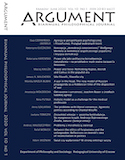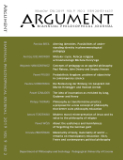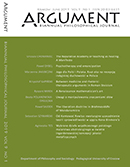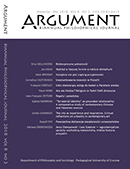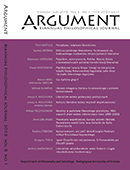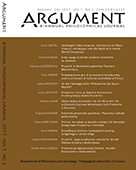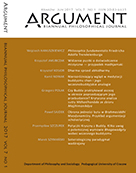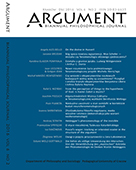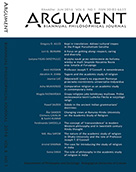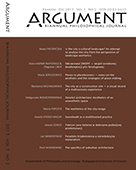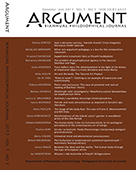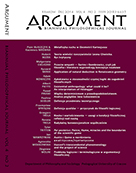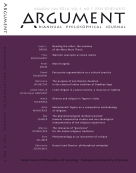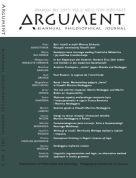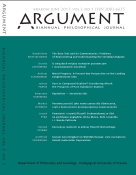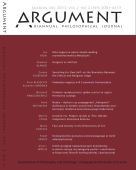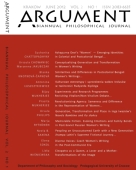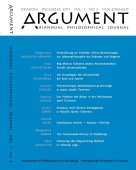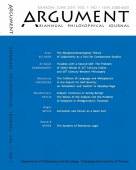e-ISSN 20841043
DOI 10.24917/20841043.7.2
Kraków, December 2017, volume 7, number 2
SPIS TREŚCI

Temat wiodący numeru:
Plutarch z Cheronei — między filozofią, biografią i wychowaniem
red. Joanna Komorowska i Katarzyna Jażdżewska

Od Reakcji
Introduction to the issue: Plutarch of Chaeronea… (Joanna KOMOROWSKA) (209-210)
Artykuły
Krzysztof ŁAPIŃSKI, ORCID, Polemika przeciwko polemice. Plutarcha krytyka epikureizmu (211-221) (DOI 10.24917/20841043.7.2.1)
Abstrakt
Polemic against polemics. Plutarch’s attacks on Epicureanism Plutarch’s attitude toward Epicurean philosophy is extremely hostile. According to him, at the core of Epicureanism is subversiveness, an attempt to attack the most fundamental components of Greek culture: traditional morality, religious beliefs, educational, and political commitment. Moreover, the Epicureans were the only philosophers in antiquity who openly criticised Socrates, first and foremost for his εἰρωνεία and “unreasonable” death. In the article, the main tenets of Epicureanism, as well as Plutarch’s polemical efforts, are centered around the figure of τετραφάρμα-κος, or the “fourfold remedy”.
Słowa kluczowe: Plutarch; Epicurus; Epicureanism; tetrapharmakos
Michał DAMSKI, ORCID, Kilka uwag na temat polemiki Plutarcha ze stoikami (223-232) (DOI 10.24917/20841043.7.2.2)
Abstrakt
Some comments on the polemics of Plutarch with Stoics The purpose of this article is to briefly discuss several key anti-stoic arguments presented in Plutarch’s polemical texts — De stoicorum repugnantiis and De communibus notitiis adversus stoicos. The paper argues that the polemic against Stoicism is rather ill-disposed and that the presented arguments, despite their rhetorical power and elegancy in language, show an insufficient understanding of the criticised doctrine.
Słowa kluczowe: Stoic philosophy; ethics; stoic sage; moral progress; Chrysippus; Plutarch of Chaeronea
Anna MARCHEWKA, ORCID, Portret Herodota w świetle traktatu De Herodoti malignitate Plutarcha z Cheronei (233-246) (DOI 10.24917/20841043.7.2.3)
Abstrakt
Portrait of Herodotus in the light of Plutarch’s treatise De Herodoti malignitate As a Platonist and moralist Plutarch paid particular attention truth. No wonder that in his reference to Herodotus’ Histories he took into consideration the issue of historical truth, which was for him very important — both in its ethical as well as didactic aspect. In his De Herodoti malignitate the Chaeronean moralist is concerned with truth as well as with offering moral uplift. Plutarch presents Herodotus as a perfidious liar who falsely presented such famous and heroic Greeks as Miltiades, Leonidas, Themistocles or Pausanias and — above all — depreciatingly treated the Boeotians and Corinthians. Moreover, Plutarch accuses the historian of Halicarnassus of being malicious (κακοήθεια). For him Herodotus’ lies were deliberate and slandering. Herodotus was also a blasphemer, a pro-barbarian historian; a man who disregarded women. Finally, we get the Plutarchan portrait of Herodotus himself as a blunt barbarian (ὁ ἔσχατος Καρῶν). Such a presentation of Herodotus seems to attest to Plutarch’s own prejudices, if not wickedness. By the same, however, one must take into consideration the literary tradition in which the whole treatise is rooted. So De Herodoti malignitate contains features of historical polemics and is an example of judicial rhetoric, in which the biographer attempts at persuading his readers that his charges against Herodotus are well justified. The treatise is a work representing the new intellectual trend, the so-called Second Sophistic; a polemic written in a period when the Greek intellectuals were deeply engaged in taking issues with past writers. Moreover, a fundamental aspect of De Herodoti malignitate should be taken into account — truth which is analyzed from a moral and psychological perspective. Although a leading motif of the treatise is truthfulness, the direct subject-matter of Plutarch’s considerations remains a lie, or — to put it exactly — lying. Accordingly, the Boeotian moralist singles out and analyses all the fundamental forms of lying. A suitable interpretation of the treatise De Herodoti malignitate depends thus on our knowledge of the cultural distance between Herodotus and Plutarch, although both authors were the representatives of Greek prosa.
Słowa kluczowe: Plutarch; Herodotus; truth; liar; malice; moralist
Tomasz ŁADOŃ, ORCID, Obraz wojny domowej z lat 83-82 przed Chr. w Żywocie Lucjusza Korneliusza Sulli Plutarcha z Cheronei (247-258) (DOI 10.24917/20841043.7.2.4)
Abstrakt
An image of the civil war of the years 83–82 BCE in Plutarch’s the Life of Sulla The author of this article is interested in how Plutarch of Chaeronea created the picture of the Sullan War in Parallel lives, especially in the Life of Lucius Cornelius Sulla. Firstly, the author notes that in presenting the civil war Plutarch was dependent on the Memoirs of Sulla. But not only. There are fragments from other source too, probably the same that Appian of Alexandria used. Therefore the Author wonders to what extend Plutarch was tendentious in presenting the Sullan War. Secondly, the author shows which moments of the Sullan War were of especial interest to Plutarch of Chaeronea and tries to answer why some of the events (for example the negotiations between Sulla and Scipio) Plutarch was to described so briefly. Finally, the author indicates why this report of Plutarch of Chaeronea remains a very important source for any historian of the civil wars in Rome.
Słowa kluczowe: Plutarch; Lucius Cornelius Sulla; First Civil War; Late Roman Republic; Sulla’s Commentarii
Lucyna KOSTUCH, ORCID, Kleopatra i eros w Żywocie Antoniusza. O nadinterpretacji dzieła Plutarcha (259-270) (DOI 10.24917/20841043.7.2.5)
Abstrakt
Cleopatra and Eros in Plutarch’s Antonius. On overinterpretation of Plutarch’s work Historians, writers and artists who wanted to pay homage to Cleopatra once again, referred to and still refer to Plutarch’s Life of Antony, first and foremost. It can seem that this main, if not the only ancient work, being quite a compact story about the Egyptian queen, has been ultimately interpreted in numerous review editions and biographies of Cleopatra. However, Plutarch’s Cleopatra has not been analysed as a separate work — excerpts from Life of Antony have always been combined with other sources in order to obtain a single picture. And in belles-lettres, the work of this ancient moralist have been exploited for centuries in such a way that it is no longer Plutarch’s property. Literary works from different epochs, in the form of interpretations, with Shakespeare’s Antony and Cleopatra at the head of the list, have distorted the ancient moralist’s message. It turns out that when we reject Shakespeare’s prism that we usually use when examining Plutarch’s Cleopatra and we start to analyse Antony’s biography only in the context of other works written by the moralist of Chaeronea, considering them to be a peculiar comment on Life of Antony, we are able to see a completely different picture to the one we are used to. Divine powers, present on the pages of the ancient work and implicating gods and people in love and desire do not have access to the queen. However, everything suggests that in the case of “the romance of all time” we can see in the moralist’s work something he did not write at all. We refer to Life of Antony and we envisage the character of Cleopatra described by Shakespeare and his successors.
Słowa kluczowe: Plutarch; Cleopatra; Life of Antony; eros
Katarzyna JAŻDŻEWSKA, ORCID, Plutarch w Semeioseis gnomikai Teodora Metochitesa (271-282) (DOI 10.24917/20841043.7.2.6)
Abstrakt
Plutarch in Semeioseis gnomikai of Theodor Metochites The paper focuses on the reception of Plutarch’s Moralia in Theodore Metochites’ Semeioseis gnomikai. It discusses chapter 71 of Metochites’ work, one of several chapters focused on ancient authors, which is dedicated to Plutarch. Metochites praises Plutarch as a wise man and a philosopher and in particular approves of his character. According to Metochites, Plutarch was not tainted by the usual flaws of intellectuals such as envy and arrogance, but was motivated by a pure love of wisdom and generously acknowledged the achievements of his predecessors. Metochites interprets Plutarch’s erudition, polymathia, as a sign of a noble, high-minded nature, and therefore as evidence of moral virtue.
Słowa kluczowe: Plutarch; Theodore Metochites; reception; Byzantium
Dawid NOWAKOWSKI, ORCID, Plutarch i jego praktyczne znaczenie: bonae litterae Erazma z Rotterdamu (283-297) (DOI 10.24917/20841043.7.2.7)
Abstrakt
Plutarch and the practical dimension of his oeuvre: bonae litterae of Erasmus of Rotterdam The present essay aims to study the peculiarities of Plutarch’s impact on the works of Erasmus of Rotterdam, and the importance of the Cheronean for the Erasmian concept of bonae litterae. The paper starts by tracing the origins and character of Erasmus’ acquaintance with Plutarch’s writings, then it emphasizes Erasmus’ regard for the moral aspect of the Cheronean legacy and the privileged position of the Greek moralist within Erasmian thought.
Słowa kluczowe: Plutarch of Cheronea; Erasmus of Rotterdam; bonae litterae
* * *
Kamil NOWAK, ORCID, Klasyfikacja doktryn buddyjskich według Zongmiego a istota religii (299-310) (DOI 10.24917/20841043.7.2.8)
Abstrakt
The classification of Buddhist doctrines by Zongmi and the essence of religion In the paper the system of doctrinal classification (pànjiào 判教) created by the Buddhist scholar of the Chinese Tang Dynasty (618–907) Guifeng Zongmi (Guīfēng Zōngmì 圭峰宗密, 780–841) has been analyzed. The paper consists of two parts. In the first part the author describes Zongmi’s doctrinal classification, focusing on the process of the deconstruction of consecutive Buddhist doctrines. In the second part the author compares particular doctrines with the most important theories on the essence of religion. The comparison aims at revealing the limitations of those theories, when applied to the understanding of the religious systems, based on the gradual attaining of gnosis, such as the system of panjiao. In the conclusion the author suggests the creation of a synthesis of the enlisted concepts of religious studies, based on the
synthesis of the Buddhist doctrines combined within the panjiao system.
Słowa kluczowe: Zongmi; Chinese philosophy; Buddhism; Chan; religious studies; panjiao
Łukasz KOŁOCZEK, ORCID, Ist die Heideggersche Philosophie des Seyns Mystik? (311-331) (DOI 10.24917/20841043.7.2.9)
Abstrakt
Is Heidegger’s philosophy of Being (Seyn) a mystique? In this article I examine whether late Heidegger’s philosophy (Gesamtausgabe volumes 65–74) can be called a mysticism. For serious reasons the answer should be negative. Heidegger’s early statements relating to the mystique are very unflattering. I try to grasp what the Heidegger’s exact attitude to the mystique is. Reflections on the mystique do not appear in late Heidegger’s philosophy (with one exception). Heidegger treats the term “mysticism” as an objection to thinking, which consists in masking a lack of understanding of thinking. According to the immanent criteria, the philosophy of Being cannot be called the mystique. But it is possible to transpose the concept of the mystique, which means to carry the word from the first in another beginning. The second part of my work is an attempt at such a transposition. As a result I obtain the word “mysticism” conceived from the side of Being, that is as a source for mysticism conceived in the traditional way. So I can say that the philosophy of Being is a mystique in this particular sense of this word.
Słowa kluczowe: Martin Heidegger; mystique; philosophy; Being
Polemiki i dyskusje
Anna CZEPIEL, ORCID, Heidegger’s Manichaeism. Comments on Peter Trawny’s Heidegger and the Myth of a Jewish World Conspiracy (333-342) (DOI 10.24917/20841043.7.2.10)
Pełny tekst
Daniel Roland SOBOTA, ORCID, Przewalczyć egzystencję słowem. Paulem Ricoeurem o skończoności (343-364) (DOI 10.24917/20841043.7.2.11)
Pełny tekst
Anna KARNAT, ORCID, Ponowoczesne gry w przestrzeni tanatycznej, czyli o zmianach w kulturze pochówku w Polsce (365-381) (DOI 10.24917/20841043.7.2.12)
Pełny tekst
Okiem filozOFFa
Filip KOBIELA, Letnia szkoła Konika Polnego (383-386)
Pełny tekst
Recenzje książek
Bernard Suits, Konik Polny. Gry, życie i utopia. Rec. Jakub GOMUŁKA (387-391)
Pełny tekst
Adam Olech, Semantyczna teoria poznania. Rec. Grzegorz TRELA (393-399)
Pełny tekst
Zapowiedzi i zaproszenia
Power and Creativity, 50th Annual SACP Conference, Kraków 2018 (401-402)
Pełny tekst
Autorzy tomu
Pełny tekst


